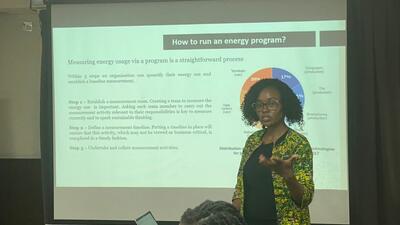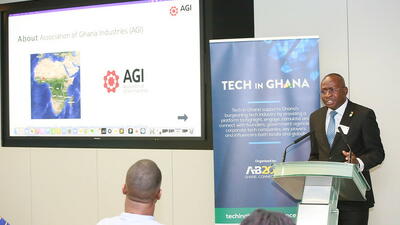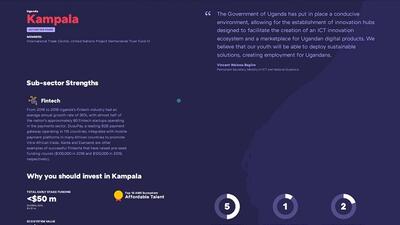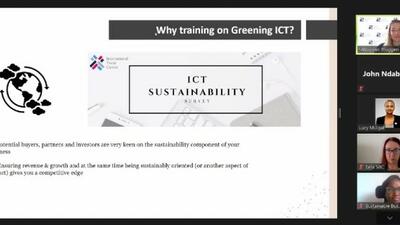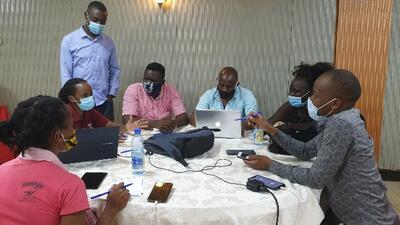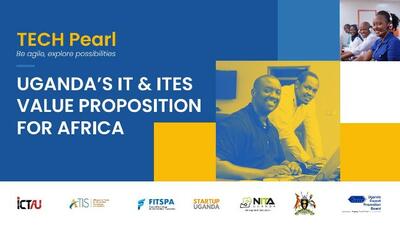

Building Brand Uganda: Getting the IT & ITES Value Proposition for Africa Right
Uganda, known globally as a prime tourist spot, is now striving to be an ICT services destination.
“Uganda is open for business,” stated Grace Labong, vice chairperson of Uganda’s Alliance for Trade in Information Technology Services (ATIS) and CEO of Vantage Communications, a marketing consulting firm.
“We’ve got an educated and agile work force, we’ve got regulations and policies in place, the government has invested in the infrastructure, we are geographically in the center of Africa, and we speak English – the international language of business,” she added.
“But it turns out not many people know what we can provide, so it became important to create awareness of the IT and ITES solutions that come from Uganda,” Labong noted.
A B2B Perspective
ITC, through its NTFIV program, worked with key Uganda stakeholders to develop the Value Proposition of Uganda’s IT & ITES Sector for Africa, promoting its unique IT advantages and cost efficiencies.
“What makes us different? I say we have a young vibrant, IT- savvy population, ready to service your market, and we come in at the right price,” said Stella Ayikoru, Export Marketing Executive–services at the Uganda Exports Promotion Board (UEPB).
“This is very important for the country’s future,” Ayikoru said. Whereas three years ago Uganda’s emphasis was on exports of coffee, gold and cotton, “this value proposition will change the dynamic of IT exports from Uganda,” she added.
Uganda is currently setting its sights on Africa’s leading economies: South Africa, Nigeria and Egypt, as well as neighboring Kenya and Rwanda. Next, it plans to expand to Tanzania, Ghana, Zimbabwe and Zambia, all English-speaking countries.
Labong worked with NTF IV on the brand implementation strategy for the value proposition, focusing on a strong B2B perspective
What Uganda has to offer
“The first is business operational activities such as legal, financial, record management, data, analysis, which can be outsourced to Ugandan companies,” said Labong. “Next is digital, so using Ugandan companies for digital based technology, cloud systems, big data and analytic services and IT web development.”
“The third is offshoring, whereby companies that have more work than they can handle can push some of their app and software development to Ugandan companies, or those companies who want to reach African markets but don’t want to be physically here, can work through Ugandan companies,” she explained.
Uganda is a new entrant into the digital offshoring market, ranking 114 globally. The aim is to get into the world top ten. It’s a tall order.
The challenges
“Most of our companies have the knowledge and competencies, but struggle with things like finance. So, finance is one of the biggest challenges. Second would be the ‘country of origin’ effect, where potential clients wonder if Ugandan companies are able to deliver. The third challenge is certification, as this can be quite expensive, and finally a lack of market intelligence and access,” explained Ayikoru.
NTF III and IV worked with stakeholders to design a program suited to Uganda’s challenges.
“Before, the industry was fragmented and scattered. With NTF, the exposure we received, the quality management, the trainings – it has been amazing. But we now need to grow up, we need to stand on our own feet and move to the next level,” Labong said.
Working together for success
The next step is to bring the value proposition to the market, a process that will depend heavily on a coalition of Uganda’s IT and ITES stakeholders.
UEPB and ATIS are working on promoting services exports, briefing commercial attaches in Uganda’s foreign mission in the target markets. The Ministry of Trade is working on the policy and regulation side, while the Ministry of ICT and National Guidance will focus on certifications and permissions.
Also involved are the National Information Technology Association of Uganda (NITA-U), the ICT Association of Uganda (ICTAU), Startup Uganda and the Financial Technology Service Providers Association (FITSPA).
“Every ministry and agency has a role to play, but we work in unison,” explained Ayikoru. “For me, success is when we have 20 companies with contracts from different countries and they are all able to deliver. It’s when Uganda becomes a first option for those looking for services. It is when our companies are able to get funding, bid competitively, and win,” she said.
The Netherlands Trust Fund (NTF) IV is based on a partnership between the International Trade Centre and the Dutch Centre for the Promotion of Imports from developing countries and funded by the Dutch Ministry of Foreign Affairs.




